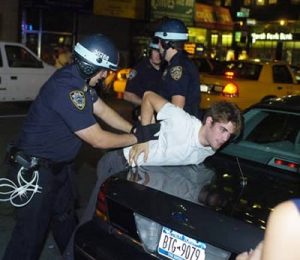In Rhode Island, understanding what constitutes disorderly conduct can be confusing. Often times, people generally think that the behavior proscribed by statute would tend to violate ones right to free speech. The law draws a very pointed distinction, however. More specifically, Rhode Island General Laws 11-45-1, otherwise known as the disorderly conduct statute provides that:
“(a) A person commits disorderly conduct if he or she intentionally, knowingly, or recklessly:
(1) Engages in fighting or threatening, or in violent or tumultuous behavior;
(2) In a public place or near a private residence that he or she has no right to occupy, disturbs another person by making loud and unreasonable noise which under the circumstances would disturb a person of average sensibilities;
(3) Directs at another person in a public place offensive words which are likely to provoke a violent reaction on the part of the average person so addressed;
(4) Alone or with others, obstructs a highway, street, sidewalk, railway, waterway, building entrance, elevator, aisle, stairway, or hallway to which the public or a substantial group of the public has access or any other place ordinarily used for the passage of persons, vehicles, or conveyances;
(5) Engages in conduct which obstructs or interferes physically with a lawful meeting, procession, or gathering;
(6) Enters upon the property of another and for a lascivious purpose looks into an occupied dwelling or other building on the property through a window or other opening; or
(7) Who without the knowledge or consent of the individual, looks for a lascivious purpose through a window, or any other opening into an area in which another would have a reasonable expectation of privacy, including, but not limited to, a restroom, locker room, shower, changing room, dressing room, bedroom, or any other such private area, not withstanding any property rights the individual may have in the location in which the private area is located.
(b) Any person, including a police officer, may be a complainant for the purposes of instituting action for any violation of this section.
(c) Any person found guilty of the crime of disorderly conduct shall be imprisoned for a term of not more than six (6) months, or fined not more than five hundred dollars ($500), or both.
(d) In no event shall subdivisions (a)(2) – (5) of this section be construed to prevent lawful picketing or lawful demonstrations including, but not limited to, those relating to a labor dispute.”
The behavior required to trigger an arrest under the disorderly conduct statute requires more than just words. Usually the words must be accompanied by some threatening or violent behavior.
Have You Or A Loved-One Been Charged With Disorderly Conduct?
If you have been charged with disorderly conduct, it is important that speak with an attorney today. Call Kilroy Law Firm today to get your free consultation: 401-855-9023. Or come visit us in Providence, RI or Fall River, MA. Our attorneys are standing by!



